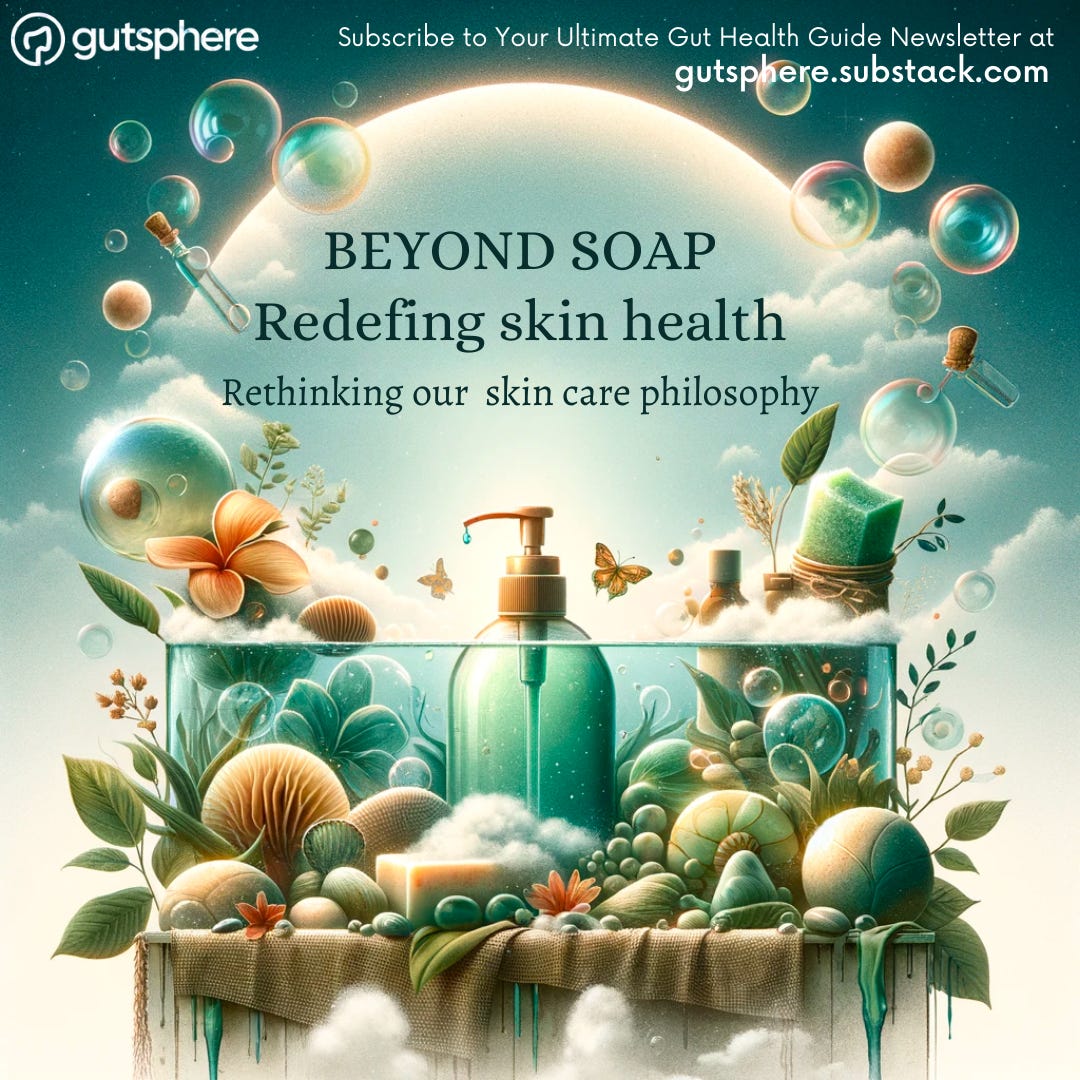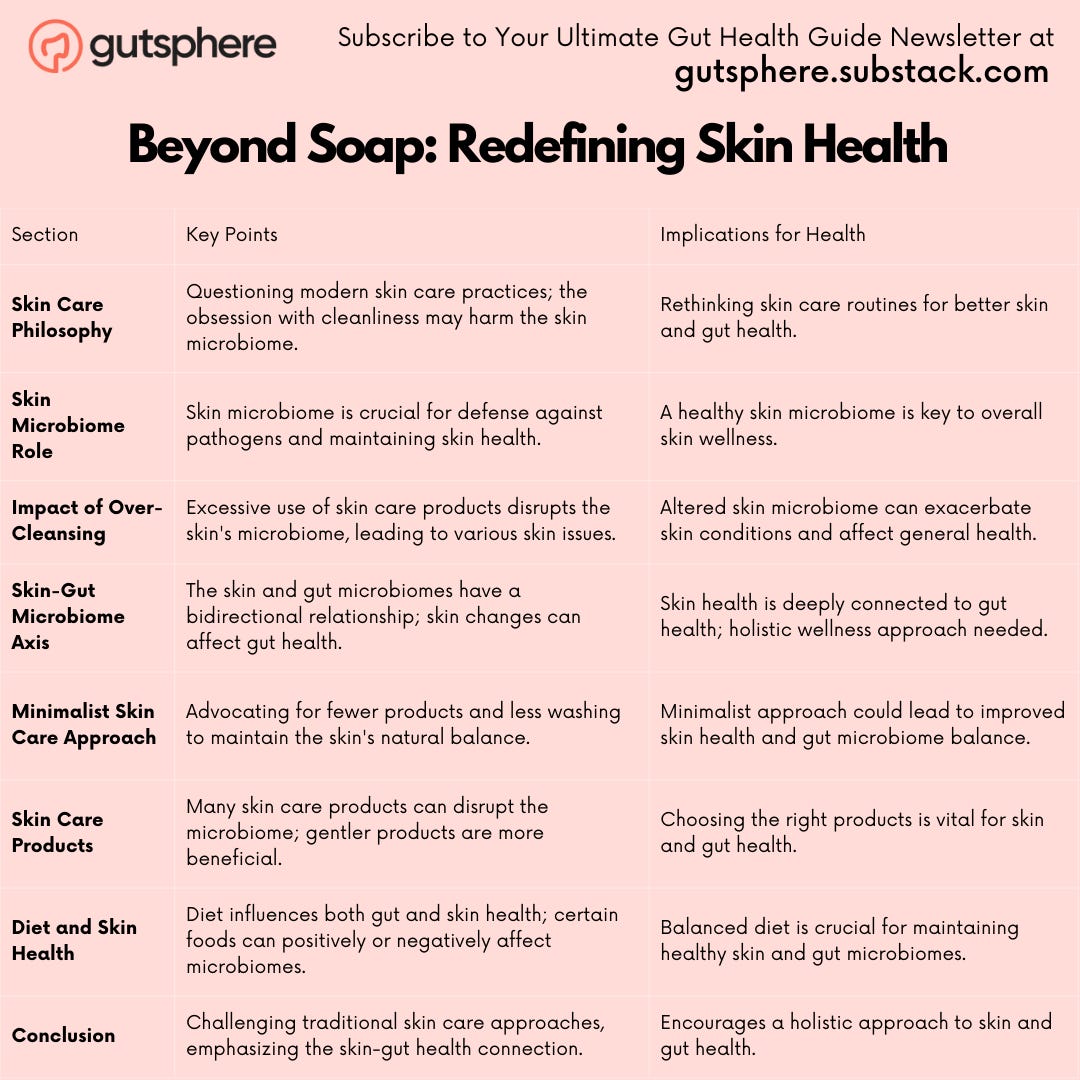Beyond Soap: Redefining Skin Health ( Part 2/7)
Rethinking Our Skin Care Philosophy
Welcome to Part 2 of our 'Gut to Skin' Series
Rethinking Our Skin Care Philosophy
In today's world, the pursuit of cleanliness often equates to using a plethora of skin care products, each promising healthier, more radiant skin. However, "Clean: The New Science of Skin" by James Hamblin invites us to question this modern approach. Hamblin's work suggests that our obsession with cleanliness might be doing more harm than good, particularly to our skin microbiome.
The Skin Microbiome: Our Invisible Armor
The skin microbiome, a complex community of microorganisms, is an integral part of our skin’s defense system. It helps in protecting against pathogens, modulating local immune responses, and maintaining the integrity of the skin barrier. This microbiome is as unique as a fingerprint, varying significantly from person to person.
Disrupting the Balance: The Impact of Over-Cleansing
Conventional skin care routines, laden with antibacterial soaps, astringents, and exfoliants, can disrupt the natural balance of the skin microbiome. Over-cleansing removes not only dirt and pollutants but also strips away beneficial bacteria and oils that protect our skin. This disruption can lead to various skin issues, including dryness, irritation, increased sensitivity, and even exacerbate conditions like acne and eczema.
Beyond the Surface: The Skin-Gut Microbiome Axis
The relationship between our skin and gut microbiomes is a complex, bidirectional communication system. Changes in the skin microbiome, induced by aggressive cleansing practices, can have implications beyond the surface. For instance, a disrupted skin barrier can increase susceptibility to allergens and pathogens, triggering systemic immune responses that may influence gut health.
Embracing a New Skin Care Paradigm
Building on the insights from James Hamblin's "Clean: The New Science of Skin," let's delve further into how a minimalist approach to skin care could lead to healthier skin and a better-balanced gut microbiome.
The Minimalist Approach: Less is More
Hamblin advocates for a less-is-more philosophy in skin care, suggesting that reducing the number of products and the frequency of washing could help restore and maintain the natural balance of the skin microbiome. This minimalist approach encourages the skin's natural oils and beneficial bacteria to flourish, which in turn can strengthen the skin barrier and improve overall skin health.
Skin Care Products: A Double-Edged Sword
Many skin care products contain ingredients like alcohol, fragrances, and preservatives, which can disrupt the skin microbiome. While these products may offer short-term cosmetic benefits, they could potentially lead to long-term issues by altering the skin's natural defense mechanisms. A shift towards gentle, microbiome-friendly products can be more beneficial in the long run.
Linking Diet and Skin Health
Diet plays a crucial role in maintaining both gut and skin health. Foods that promote a healthy gut microbiome, such as those rich in fiber, probiotics, and antioxidants, can also positively influence the skin microbiome. Conversely, diets high in processed foods, sugar, and unhealthy fats can have detrimental effects on both the gut and skin microbiomes.
Conclusion:
In this part of our series, we've challenged the conventional approach to skin care and cleanliness, highlighting the importance of the skin microbiome and its connection to gut health. By adopting a more mindful approach to skin care and considering the impacts of our diet, we can foster a healthier gut-skin relationship.
Stay tuned for our next installment, where we will explore Acne and the Gut Microbiome.
Request
Share
Our sincere request to you is to share the newsletter with your friends, family, and community so that they can benefit from the content. Also it will help us grow the newsletter, and eventually, as we release more content, digital tools, and more we will enable people around the world to live chronic disease free.
Subscribe
Feedback
Also, please give us feedback so that we can improve the content. And if there are any topics that you want us to cover please send us your questions and topics. Furthermore, if you try any of the things we provided information please share your experience with us.
Thank You
GutSphere Team
Disclaimer
Please note that the information provided in this newsletter is for informational purposes only and should not be considered as a substitute for professional medical advice, diagnosis, or treatment. If you have any concerns or questions about our health, please consult with a licensed healthcare professional. The information contained in this newsletter is not intended to diagnose, treat, cure, or prevent any disease. The publisher and authors of this newsletter assume no responsibility for any adverse effects that may result from the use of the information contained herein.



